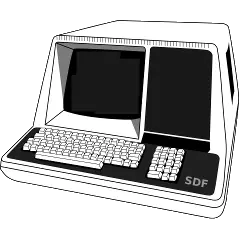

Yep, I’ve got a stack of 5-10 year old optiplexes (optiplexi?) running proxmox.
I’m a professor of Religious Studies with a research focus on medieval Islam, particularly with regard to Sufism, the occult sciences, and manuscript culture. I also interested in all things linux, occult, scifi, UFO, and anarchist.


Yep, I’ve got a stack of 5-10 year old optiplexes (optiplexi?) running proxmox.


Yes, you can use it fully offline.
To back it up I believe you’d just need to backup your .pass and .gnupg directories.
I haven’t used keepass, but the entry from the archwiki should give you a good idea of usage, and it also lists some helper apps: https://wiki.archlinux.org/title/Pass


In the US, many public universities allow access to the public, including use of computer terminals that will allow access to paid databases. In many cases, you could bring in a usb stick and save copies of articles downloaded from such databases, or at worst you could pay a small fee to print some stuff out. AFAIK, that kind of access varies state by state though, so you need to call university libraries near you to find out.


I’m a college professor in the humanities (religious studies, history). Got into linux about 5 years back, partly because it comports better with my lefty politics than the alternatives, but also just because I’ve long been a closet computer nerd. I currently run a couple of proxmox servers on old optiplexes I grabbed off ebay. Full *arr stack with jellyfin on docker, a Tails VM for TOR stuff, NAS (omv on a vm), some other dockerized stuff: linkding, radicale, alexandrite (a self-hosted lemmy client, which I’m currently writing this on), various backup utilities.
It’s basically just a hobby for me, though the switch to linux has also totally changed my academic workflow, e.g. I do all my writing in nvim + latex now, use syncthing to sync my home desktop, laptops, and office computer, etc. I dig divesting myself from corporate computing to the greatest extent possible, appreciate the privacy benefits, and generally just enjoy the community-driven spirit of the whole thing.


I mostly use debian + docker or alpine + docker for this kind of thing (usually running as VMs on a proxmox server). Both are utterly reliable in my experience, though I’ve been tending more often toward alpine these days, because it’s just so light and simple. I haven’t tried any of the immutable systems, in the general spirit of why fix what’s not broken. I don’t even bother with snapshotting either, though that’s mostly because I use some of the proxmox tools for backing up the VMs.
I work for a large state university and run linux on my office machine, despite the fact the IT office dept doesn’t officially support it. I told our IT guy once what I’m doing and his response was, “cool.” Of course I’m totally on my own if anything goes wrong. It helps that I’m a prof and most of my on-campus work doesn’t involve much time on a computer, aside from basic web and documents stuff. tldr, in my case I’m able to just do it without asking anyone’s permission, and it’s worked out great for several years now, but a lot of jobs aren’t like that obviously.


That’s a fantastic response. Thanks.
I’ve used herbstluftwm on my main desktop for years. Love it. Manual tiling works well for me. Totally flexible and customizable. Switch between floating and tiling with a keypress, etc.
And then on various other machines.
With that minimal self-hosted version, do you know if you can log into it using the firefox extension on linux? The only client they mention is the iOS one.
The irony is that once you find your way around through the default keys and search a little you soon discover how easy it is to reset them with “sane” settings. Same for window frames, etc. But yes, there’s definitely a learning curve.
endeavourOS
spiral linux


Why porteus? That seems like a very specialized distro, and the fact that it’s optimized to run on usb sticks might have something to do with the filesystem issue. If this is just for a laptop or desktop then I’d recommend running a mainstream distro meant to be used on a pc. If you do that then ext4 will work fine. If you’re comfortable with ubuntu and not too freaked out by working in the terminal then why not try endeavourOS or something along those lines?

I write for a living (academic) and have also been keeping personal journals since I first learned to write. For my academic writing I’m all digital, but I always journal by hand. In my experience there are quite very different types of thought and composition involved between the two, and I value them both immeasurably. So now, I don’t think paper is ever going away.

Digital is also shitty for long-term text storage, frankly. Data formats change constantly, software to read stuff changes constantly, disks go bad, the power goes out, and so on. The only thing that comes close to rivaling the durability/reliability of paper kept in a dry dark place and free of bookworms is clay tablets, and they’re a real hassle to make and lug around. Archivists know that if you really need to preserve a text you print it on paper and store it appropriately.
But isn’t that every linux forum?